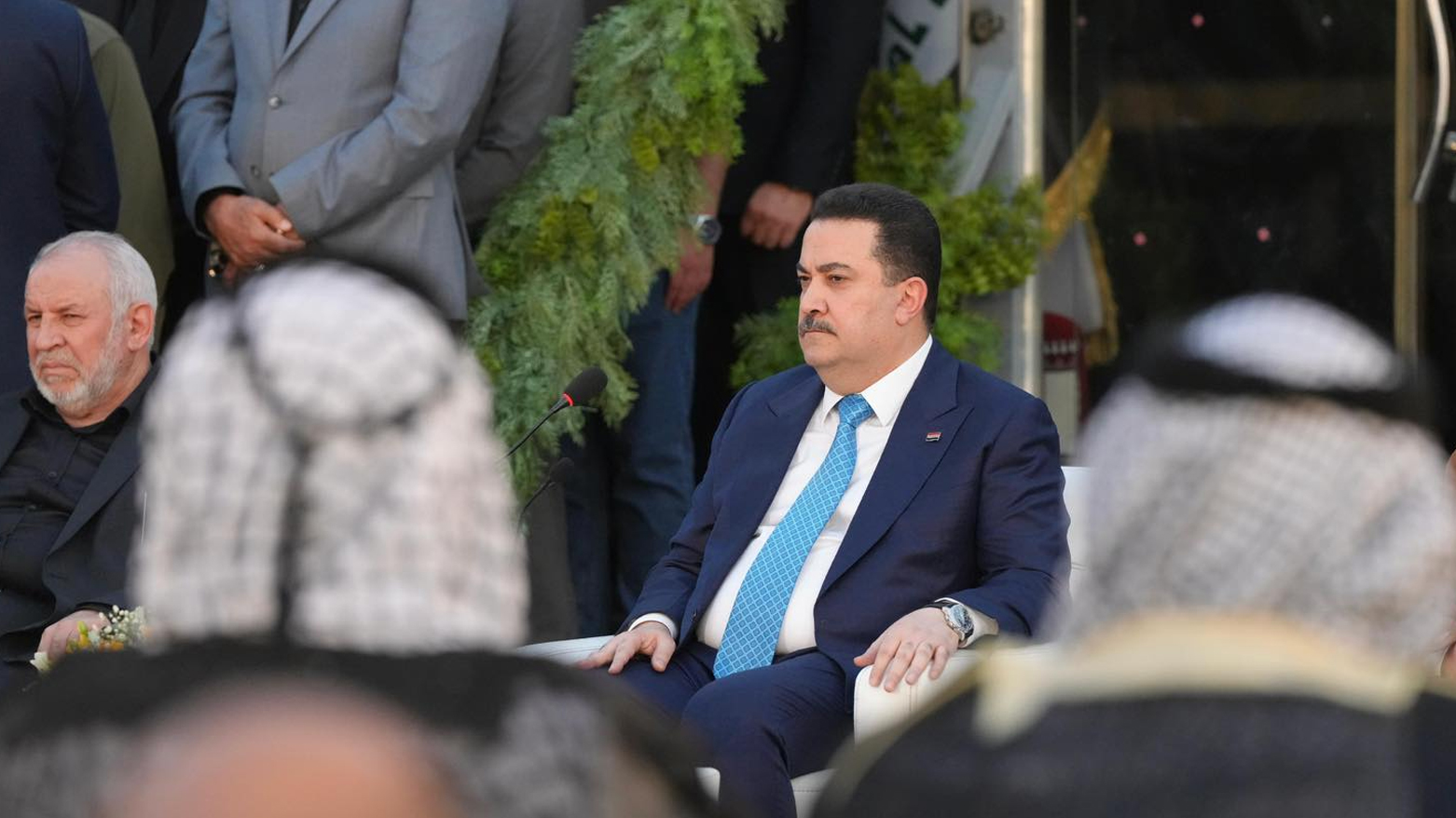Iraqi PM: Baghdad Restructures Ties with Coalition, Secures $100 Billion in Global Investments
With Iraq’s November elections looming, al-Sudani’s pledges of reform, booming foreign investment, and strong international ties face skepticism from critics who see his statements as campaign rhetoric echoing past unfulfilled promises.

ERBIL (Kurdistan24) — Iraqi Prime Minister Mohammed Shia al-Sudani on Saturday emphasized that Iraq’s decision to recalibrate its relationship with the international coalition does not signal a break with the global community, stressing that Baghdad today enjoys its “best relations” with both regional neighbors and the wider international sphere.
Speaking at a tribal gathering in Baghdad’s Karkh district, al-Sudani highlighted the government’s foreign policy approach as one rooted in balance and constructive engagement. He underlined that Iraq’s circumstances are no longer comparable to 2014, when the coalition was formed to confront the Islamic State (ISIS).
“Restructuring the relationship with the international coalition does not mean cutting ties with the global community. Iraq today stands on stronger footing, with greater stability and better relations with its regional and international partners,” al-Sudani said, according to a statement from his media office.
The prime minister further pointed to the growing international confidence in Iraq, noting that the presence of leading global companies and more than $100 billion in Arab and foreign investments across multiple sectors demonstrates the country’s new economic appeal.
On regional developments, al-Sudani reiterated Iraq’s clear and declared stance on the ongoing crisis in the Middle East, saying Baghdad has actively joined regional efforts to halt "Israeli aggression" and prevent the expansion of the conflict.
“Our responsibility has always been to safeguard Iraq’s interests and avoid dragging the country into war,” he added.
Al-Sudani also used the occasion to address domestic challenges and reforms, assuring tribal leaders that the government is committed to strengthening democratic practices through active electoral participation, advancing administrative and economic reforms, and executing strategic projects across the country.
He emphasized Baghdad’s share in ongoing development efforts, citing major infrastructure and service projects aimed at compensating the capital for years of neglect and destruction caused by terrorism.
“The path of sustainable development requires the combined efforts of tribes, elites, national political forces, and all Iraqis who believe in our project,” he said.
The prime minister reiterated that Iraq’s security and stability remain the cornerstone for development, underscoring the sacrifices of security forces and the Iraqi people in safeguarding the country. He stressed the need to uphold the rule of law, restrict weapons to state institutions, preserve national sovereignty, and continue the fight against corruption.
Al-Sudani concluded by framing his administration’s guiding principle: “Iraq First” is not just a slogan, but a practical and moral obligation toward all Iraqis, across all communities and affiliations.
Al-Sudani’s remarks come at a time when Iraq is moving closer to its next parliamentary elections, scheduled for November 11, 2025. Against this backdrop, his statements are being interpreted by many political observers as carrying the tone of an election campaign rather than concrete policy commitments.
While the prime minister highlighted achievements in governance, economic reform, and foreign relations, critics argue that much of this rhetoric mirrors familiar promises made by successive Iraqi administrations, many of which have struggled to translate words into tangible progress.
For years, Iraqi leaders have pledged to combat corruption, promote democratic practices, and develop a diversified economy that is not dependent on oil. Yet public frustration persists. Transparency International consistently ranks Iraq among the most corrupt countries in the world, and despite repeated reform packages, few high-profile officials have been held accountable.
Many Iraqis believe that political elites—including tribal and religious figures courted by the prime minister in gatherings like Saturday’s—have benefited disproportionately from state resources, while everyday citizens continue to face unemployment, poor services, and deteriorating infrastructure.
Al-Sudani’s references to “$100 billion in foreign and Arab investments” and the presence of “major international companies” are also met with skepticism. While Iraq has indeed signed high-value contracts with foreign firms, many projects have either stalled, failed to meet deadlines, or been implemented unevenly due to bureaucratic inefficiency, corruption, or security challenges.
Baghdad’s previous attempts at ambitious initiatives—such as grand infrastructure projects or electricity sector reforms—have often been announced with fanfare but delivered minimal results for the public.
The prime minister also underlined Iraq’s “best regional and international relations” in decades, contrasting today’s situation with the crisis year of 2014, when ISIS overran a third of the country. Yet critics caution that while Iraq has improved ties with regional powers like Iran, Turkey, and Gulf states, this balance remains fragile and often subject to shifting geopolitical currents.
The insistence that Iraq’s recalibrated relationship with the international coalition “does not mean cutting ties with the global community” is viewed by some observers as a carefully crafted political message designed to reassure both domestic and foreign audiences ahead of elections, rather than a clear long-term policy direction.
Moreover, the prime minister’s pointed references to “Iraq First” and his emphasis on sovereignty resonate with nationalist voters but risk sounding more like campaign slogans than actionable strategies.
With voter turnout in past elections at historically low levels—just 41% in 2021—subject matter experts suggest that such rhetoric is primarily aimed at boosting public confidence and mobilizing participation, especially from tribal constituencies, rather than outlining concrete solutions to Iraq’s structural problems.
In essence, while al-Sudani framed his government as pursuing reform, development, and balanced foreign relations, many Iraqis remain doubtful. They have heard similar promises from past leaders and witnessed limited follow-through.
With elections just over two months away, the timing of his speech raises questions over whether the prime minister’s words reflect genuine state policy or the early stages of a calculated re-election campaign designed to win votes in November.